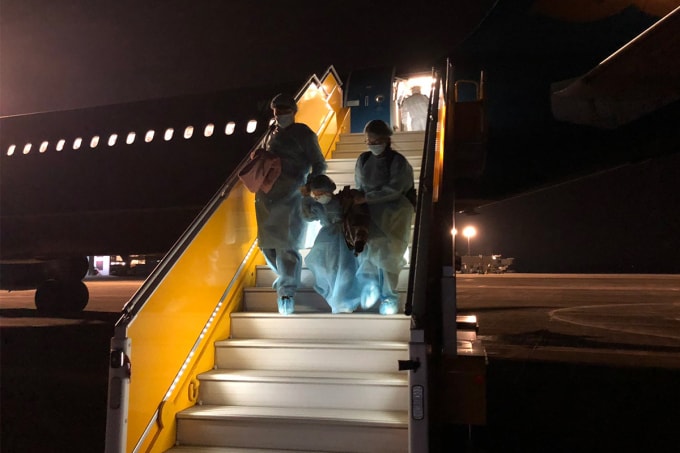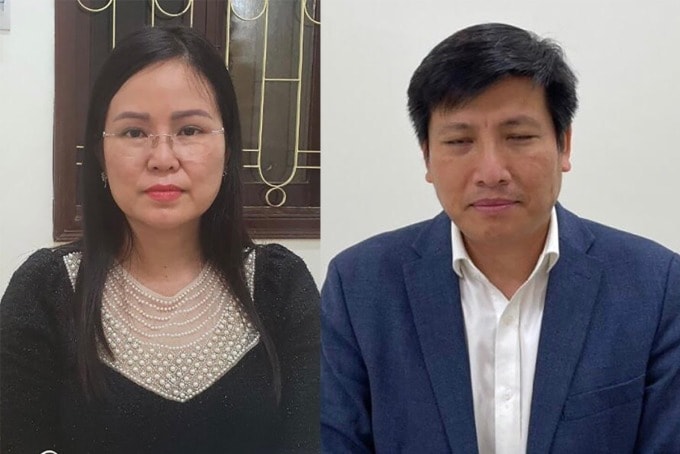The Transport Department confirmed that it was not assigned to approve the 'rescue' flight.
The Ministry of Transport affirmed that it was not assigned the responsibility of approving the list of citizens and granting licenses to businesses to organize rescue flights or "combo" flights.
The above information was released by the Ministry of Transport on the evening of February 19 in response to the dispatch of the Ministry of Public Security's Investigation Agency requesting information to clarify the case.Accept bribesoccurred at the Consular Department of the Ministry of Foreign Affairs.
Accordingly, implementing the humanitarian policy of the Party and State on organizing flights to bring Vietnamese people in difficult circumstances back to the country when Covid-19 broke out, the Ministry of Transport coordinated with the Ministry of Foreign Affairs, the Ministry of Public Security, the Ministry of Health and the Ministry of National Defense to protect citizens.
The Ministry of Transport, as the coordinating agency, is responsible for directing the Civil Aviation Authority of Vietnam to issue flight permits according to the plan approved by the Consular Department of the Ministry of Foreign Affairs. This is a mandatory procedure according to aviation law and international practice for all flights. Furthermore, the Civil Aviation Authority is responsible for notifying and guiding airlines, air traffic service providers and regulations on epidemic prevention.
The Ministry of Transport affirmed that it was not assigned the responsibility of synthesizing the needs, approving the list of citizens, and granting licenses to businesses to organize rescue flights or "combo" flights. The Transport sector, in the spirit of coordination, has created all favorable conditions to organize the earliest flight to meet the people's wishes to return home.
 |
| Citizens on a flight from Wuhan back to Vietnam, February 2020. Photo: Vietnam Airlines |
Two days earlier, the Ministry of Public Security's Security Investigation Agency sent a dispatch to the Minister of Transport requesting that the Ministry direct units to provide documents clarifying the policy of organizing "rescue" flights (free of charge) and "combo" flights (paid) to bring Vietnamese citizens back to the country starting from when? Based on what criteria and basis does the Ministry of Transport consider and approve flights and what are the processes and procedures for handling the approval for airlines to conduct combo and rescue flights?
The investigation agency requested to provide a detailed list of airlines, flights and businesses licensed by the Ministry of Transport to operate rescue flights; a list of citizens returning home along with contracts and payment costs for these flights.
The Ministry of Public Security also requested to provide a list of individuals at the Ministry of Transport responsible for receiving and approving airlines and businesses that carry out combo and rescue flights.
 |
| Defendants Nguyen Thi Huong Lan (left) and Do Hoang Tung at the investigation agency. Photo: Ministry of Public Security |
Previously, on January 28, the Security Investigation Agency (Ministry of Public Security) prosecuted and temporarily detained Ms. Nguyen Thi Huong Lan (48 years old, Director of the Consular Department of the Ministry of Foreign Affairs) and three people at this Ministry: Do Hoang Tung (42 years old, Deputy Director of the Consular Department); Le Tuan Anh (40 years old, Chief of the Consular Department Office); Luu Tuan Dung (35 years old, Deputy Director of the Citizen Protection Department of the Consular Department, Ministry of Foreign Affairs). All four people are being investigated for the crime.Accept bribes.
These defendants were accused of "personal gain" when approving and granting licenses to several companies to operate flights to bring Vietnamese citizens home. The specific violations have not yet been announced by the Ministry of Public Security.
Since the Covid-19 outbreak, Vietnam has organized nearly 800 flights, bringing more than 200,000 citizens from more than 60 countries and territories back home. When flights were opened, many people had to buy very expensive tickets and go through cumbersome procedures.
Faced with this problem, the spokesperson of the Ministry of Foreign Affairs at that time said that citizens should not contact unofficial information sites or intermediaries. Negative profiteering behaviors and changing the humanitarian nature of rescue flights must be condemned and severely punished according to the law.


